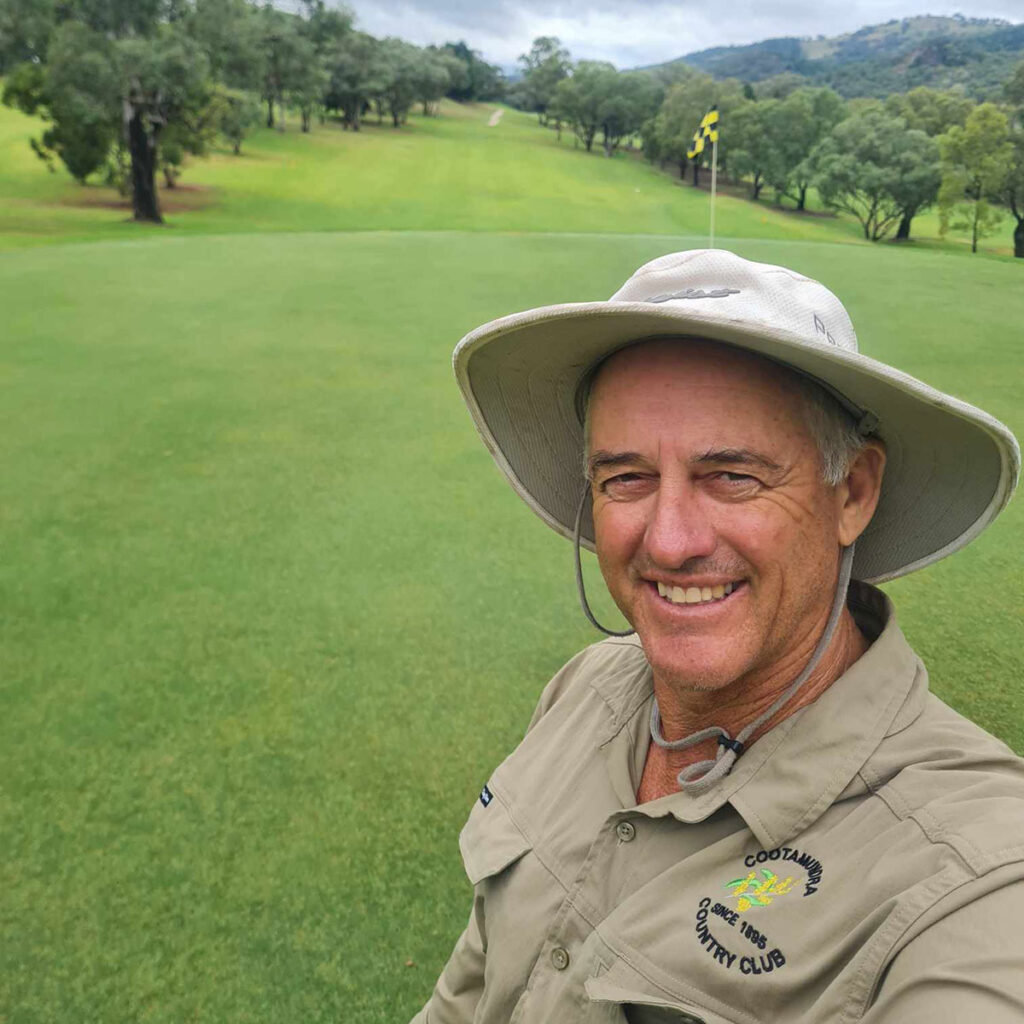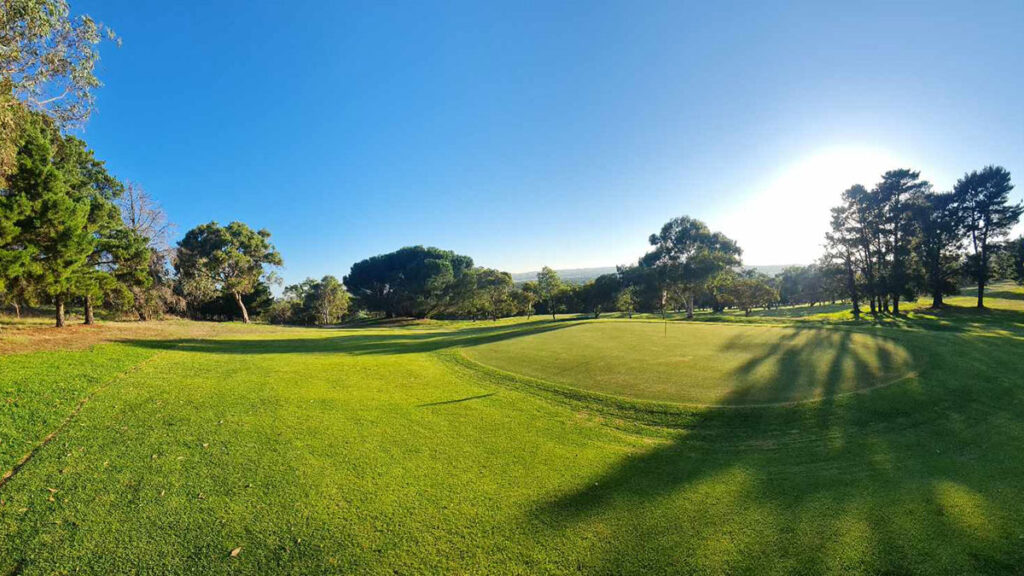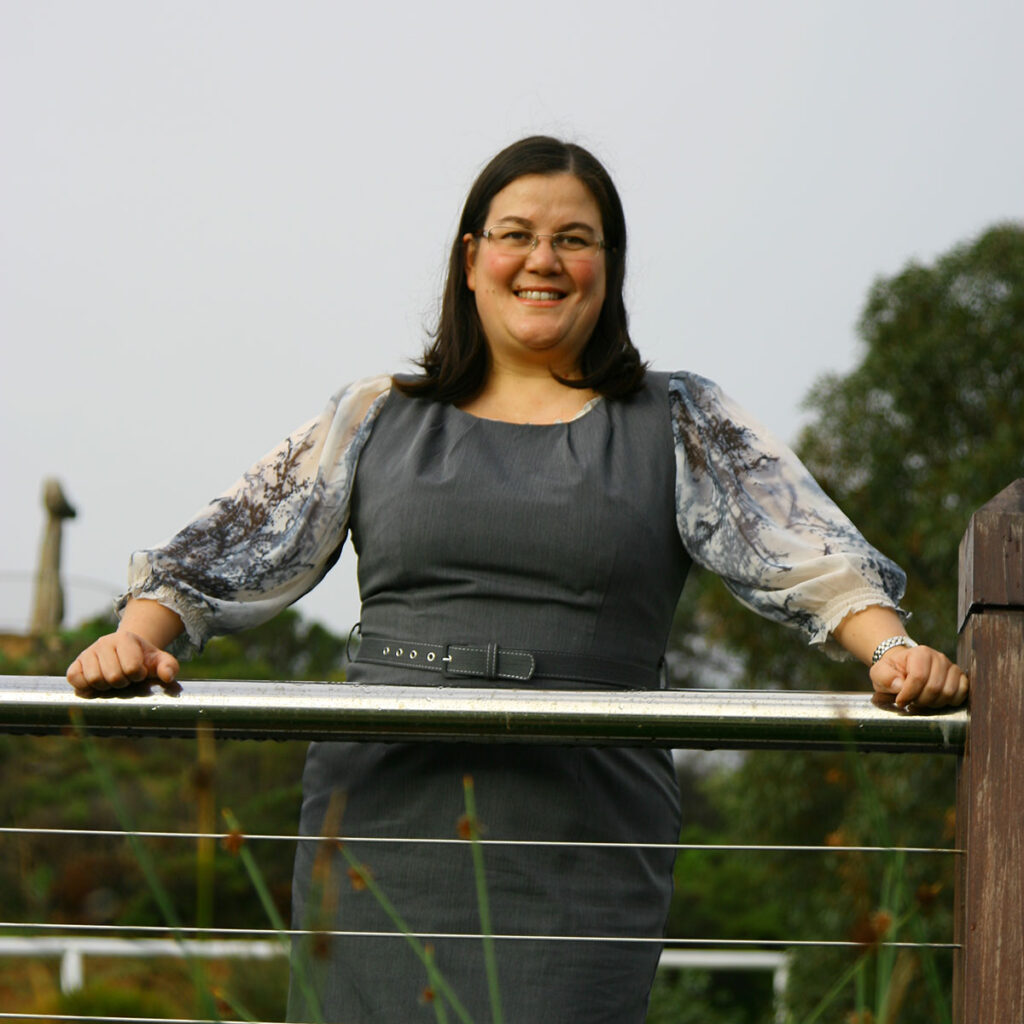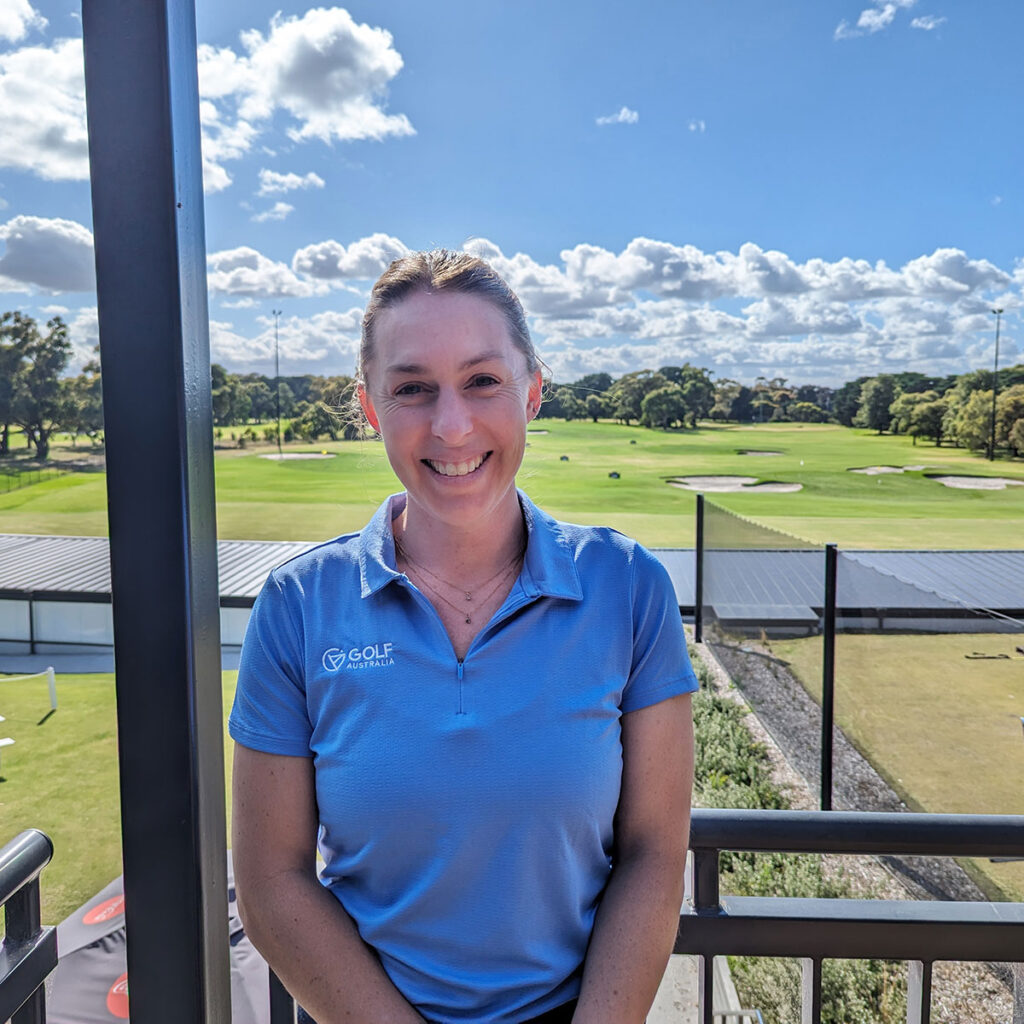It’s the rare few that can play golf for a living. But there’s an array of career opportunities for people wishing to work in golf – from caddieing to clubfitting, administration to landscaping. We asked a variety of people how they came to get a job in golf.
Feature Image – Getty images: CHLOE ZOLA

Never too late to change career path
John Stephens, Turf Manager, Cootamunda Golf Club, NSW
In his early 50s, John Stephens was seeking a less stressful lifestyle. He would eventually sell his equipment-hire business and take a job as a groundsman at Cootamundra Golf Club in the New South Wales Riverina.
Stephens had been on the Cootamundra board when ‘greenkeeper’ Wayne Loiterton expressed an intention to retire after 34 years. Without any staff to replace him, Stephens offered to maintain the 18-hole course, which is the oldest in country NSW.
“I watched what he did and thought, Geez I can do that. As a small club, it fixed one of the problems for the board,” Stephens says.

After a year being tutored by Loiterton about how to maintain Cootamundra’s kikuyu fairways and bentgrass putting surfaces, Stephens now maintains the club’s 96-hectare property (including lawn bowling green and croquet court) with a part-time employee and two volunteers. He receives supervision from club board member Chris Dawe, a certified turf manager who works as a sales representative for Toro.
It’s a far cry from when Stephens supervised a dozen or so employees in his equipment-hire business that lent machinery to tradesmen and erected wedding marquees anywhere between Cootamundra, Wagga Wagga, Yass and Canberra.
“Just a change of lifestyle. Looking for that outdoor exercise and a bit of peace and quiet,” Stephens reflects about the decision to sell the equipment-hire business.
“I was looking for a less stressful lifestyle… Have you ever tried to deal with five brides in a weekend? You’ve seen weddings. Then multiply that by five and times that by 15 weeks in a row. Throw in the weather. Throw in staff. It gets ugly quick… So there was a lot of supervision and co-ordination. A lot of logistics… There’s nothing more peaceful than mowing the grass. Getting paid to mow stripes.”
It’s been a relatively seamless transition for Stephens, who is two years into a turf apprenticeship. Without prior experience in the turf industry, the now 57-year-old reasoned he could adapt quickly.
“I’m probably lucky in a sense because of my life experiences. Like in the hire game, I can drive just about any piece of machinery. I’ve got a working knowledge of repairs and things like that. So the machinery has been easy in that sense. Just being older, you’ve got more life skills. You don’t panic. Irrigation – I actually sold spray units for a while, so spraying doesn’t worry me. And I’ve got some pretty good supervision that’s helped me through it.”

A passionate advocate for golf
Monina Gilbey, Biodiversity Manager, Glenelg Golf Club, SA
Golf was never on Monina Gilbey’s radar growing up. Yet now as biodiversity manager at Glenelg Golf Club, she’s playing a leading role in promoting the benefits of golf courses to the wider community.
Gilbey, 50, used to work as a public servant, writing legislation for the National Environment Protection Council (such as for air-quality standards, national pollutant inventory and used packaging-material standards). “From writing legislation – which I really felt like it wasn’t doing enough to protect the environment – I was looking for some other way to make a difference,” she recalls.
Gilbey went and studied to be a garden designer at TAFE SA in Urrbrae. While studying, she began doing voluntary work for her local council (City of Holdfast Bay) in revegetation projects. That led to design work for the council and she eventually became a contractor with projects in wildlife strategies and biodiversity-management plans.
From there she was a contractor engaged by superintendent Tim Warren for two projects at West Beach Parks Golf (formerly Adelaide Shores). When Warren eventually relocated to Glenelg Golf Club, he offered Gilbey a job as vegetation officer.

“I really didn’t know what I was in for, because golf was never on my radar,” she says.
Six years later and now in the role of biodiversity manager at Glenelg, Gilbey uses her administrative skills and horticultural knowledge in many ways – from establishing habitats for rare species (such as butterflies), assisting with fauna surveys (often insects and birds), applying for and administering grants, ordering plants/liaising with growers and general weeding/landscaping.
In 2022, Gilbey’s perseverance was rewarded when she and Warren won the Claude Crockford Sustainability and Environment Award from the Australian Sports Turf Managers Association. Gilbey was just the second woman to win the award in 24 years. She was also recognised as 2022 Employee Of The Year by Clubs South Australia.
Significantly, it’s not just the golf industry where Gilbey is leaving an impression. She’s been able to influence environmental authorities about how golf courses can be important wildlife refuges.
“Green Adelaide has seen the value of having a golf course as a protective urban environment. So it’s an area that can be managed by golf staff when other areas like [nature] reserves with councils can’t be managed as closely.
“If golf courses can be part of that re-wilding and contribute to urban biodiversity, then that shows they have a purpose for being around – more than just [for] golf. Because that is the issue golf courses face. There is a lot of pressure on their land because they take up such a big part of the urban environment. But they actually contribute a lot to the urban environment.”
Gilbey says there are many opportunities for horticultural jobs in the golf industry. As for what she enjoys most about her role, she says: “I like being able to provide a habitat for local fauna and to preserve indigenous plants for future generations. Because our seed stock and our cuttings can be used for plant [propagation]. In Adelaide, a lot of the remaining indigenous plants are at golf courses. So what we’re doing here is really important.”

From fixing bikes to fixing clubs
Alex Briggs, Club Repairer, Mullumbimby, NSW
A
n addiction to golf led Alex Briggs to fix his own golf clubs. Now after 28 seasons travelling the world as a motorcycle mechanic for the likes of Mick Doohan and Valentino Rossi [below], that addiction has morphed into his own club repair business.
A natural tinkerer, Briggs always used to re-grip his own golf clubs. It’s no different to changing grips on a motorcycle, according to the 54-year-old who is a ‘reluctant’ president of Mullumbimby Golf Club.
“But the mechanic in me assumed the reason I can’t play properly must be [because] these clubs are faulty. So I decided, ‘Oh, well, I better fix these golf clubs I’m using because that’s clearly the reason I can’t play golf properly. Turns out it wasn’t. But anyway.”
That’s exactly how the 11-handicapper became a motorcycle racing mechanic. He would fix his own bike. And that led to three decades following the Moto GP circuit where he worked as one of four mechanics in a pit crew maintaining two motorcycles.
Briggs worked for Australians Daryl Beattie (1993) and Doohan (1994-1999) before entering a lengthy association with nine-time world champion Rossi (2000-2020). And at every racetrack, Briggs made sure he knew the whereabouts of a top golf course on which to play.
On the circuit for six months of the year, Briggs would return home to Mullumbimby in the Byron Shire of the NSW Northern Rivers with plenty of time to play golf. When he finished with racing, that’s when he decided to start a stand-alone club-repair business.

“Towards the last five years of my racing-mechanic career, I started buying some of the tools that you would need [to fix clubs]. And learning and reading about repairs. It wasn’t a big step at all because a lot of it’s very basic mechanical skills that you need. So it was easy. I started accumulating the tools and now I have a business at home repairing [clubs]. I also live on a property, so I have a driving range at my home and a short-game area. So, yeah, all because of motorcycle racing. A very strange game.”
Briggs assembled all the necessary equipment in his garage: club lie-and-loft machine; putter lie-and-loft machine; linishing belts, buffs and cutting wheels that are golf-specific for cutting shafts and polishing ferrules by hand; shaft pullers to dislodge the heads of graphite shafts; frequency/CPM machine for consistent shaft matching; and a digital swingweight machine.
Briggs says he would easily average a job per day, whether it be changing a worn grip to refitting an entire set of shafts. Most work comes by word of mouth from Mullumbimby, Ocean Shores, Ballina and Byron Bay. For instance, the club member who has just broken a shaft or a local pro may contact Briggs to adjust the clubs for one of his students. Briggs also uses Twitter, Instagram and has two websites with his contact details (wrenchracer.com and wrenchracergolfdept.com).
“Because I work from home, people can just come and we just have a cup of coffee and go up the shed, turn the radio on and do it. It’s kinda fun,” Briggs says.
At this stage it’s a part-time business since Briggs has other work related to motorcycle racing. But he offers encouragement to would-be club repairers.
“I think, going forward, if you really wanted to make a business out of it, you would align it with a proper clubfitting and coaching business. I think that would probably be the real way to make the money. And that’s what some of the places are doing now with the TrackMan [launch monitors]. That’ll be my next step. Hopefully they’ll be able to come and swing indoors and we can make some adjustments based on what we see.”

A multi-faceted career in golf
Paul Howard, Clubfitting Specialist, Drummond Golf, Sydney
When Paul Howard attended the Jack Newton Celebrity Classic in 1989, little did he know it would lead to an association with golf as a caddie, travel agent and clubfitting specialist over the next four decades.
Howard left school with the intention of undertaking a traineeship under legendary Sydney professional Bill McWilliam. But his parents had other ideas and his father pushed him into a job as a clerk at the Bank of New South Wales (now Westpac).
After seven years at the bank, Howard left to become a sales representative for Air New South Wales (which was taken over by Ansett in 1993). This job led to an invitation to attend ‘The Jack’ at Tewantin-Noosa Golf Club on Queensland’s Sunshine Coast where Howard struck up a friendship with professional Russell Swanson. Howard caddied for Swanson when he attempted to pre-qualify for the 1990 Open Championship at St Andrews, missing out by two strokes at Ladybank Golf Club in Fife.
“It escalated from there,” says Howard, 60, who caddied each summer on the PGA Tour of Australasia from 1990-2002 while maintaining a full-time job in the airline industry. “I enjoyed caddieing so much that I then got some gigs with Andre Stolz, Paul Sheehan, Wayne Riley and Brett Ogle.”
It’s worth noting Howard is no slouch with the clubs. He has won four club championships at Beverley Park and attained a 1-handicap at Bonnie Doon where he played in the club’s Group 1 pennant-winning side in 1993.
For anybody wishing to become a caddie, he says: “To make it happen, it’s about getting on the practice fairway at tournaments and making yourself known. The most important attribute is punctuality. And obviously the three golden rules: turn up, keep up and shut up.”
When Ansett collapsed in 2001, Howard started his own travel business (St George Travel) and managed several professional golfers as clients. As a licensed travel agent, he would book flights, accommodation and travel arrangements for the likes of Peter Lonard, Paul Gow, Nathan Green, Brendan Jones, Paul Sheehan, Gavin Coles and Stolz.
Then in 2003, when a Drummond Golf store was opening at Taren Point in the Sutherland Shire of Sydney’s south, Ogle arranged for Howard to meet the franchise owners (Jacqui and Simon). While still in the airline business with Jetstar, Howard has now worked at Drummond Golf as a retail sales consultant for the past 19 years, assisting customers as a clubfitting specialist.
As to the qualifications to work at Drummond Golf, Howard says: “Drummond Golf employs staff that are passionate about golf. Then they will train you in everything from retail to clubfitting.”

Taking golf to the streets
Sally Peers, Local Government Co-ordinator, Golf Australia, VIC
Sally Peers is veritable proof you can forge a career in golf without being a golf tragic. A latecomer to the game, the former tennis professional and Commonwealth Games gold medallist is playing an important role in liaising with local government and growing the sport’s participation numbers.
As a crack junior, Peers won the Wimbledon Girls’ doubles in 2009. The next year she reached the quarter-finals of the Australian Open women’s doubles. At the 2010 Commonwealth Games in Delhi, she won gold in women’s doubles and a bronze in singles. Perhaps her most notable tennis achievement came in 2012 when she won the prestigious Nottingham women’s doubles title alongside a rising star by the name of Ash Barty.
Peers retired from tennis in 2017 after competing in her last Australian Open. Subsequently, she coached tennis but was keen to move into an office role. Fortuitously, a staff member at Golf Australia suggested she apply for an administrative role at the governing body’s headquarters at Sandringham. Peers started working there two years ago as a part-time receptionist/administrator.
“I love sport, so I really wanted to stay in the sports industry but move outside of tennis – to learn something different,” says the 32-year-old, who never played golf growing up but was around keen golfers such as her father and brother.
Apart from mini-golf, Peers’ first 18-hole round was at Melbourne’s Wattle Park public course a couple of years ago. But that hasn’t curtailed the 28-handicapper’s career prospects. In late 2022, Peers successfully applied for a new internal position at Golf Australia as local government co-ordinator. The role involves building relationships and educating government about the benefits of golf.
“We do a lot of work with local council with a focus on public-access golf,” Peers says. “We also do a lot of work with councils to activate golf in different ways, using different formats of the game.
“It’s quite a varied role, which I really enjoy. Depending on what support councils need with their golf facility. And we’ve done a lot with the team on championing public golf and golf-course land.”
One of last year’s bigger projects was with Maribyrnong City Council. Peers helped plan a family-orientated golf activity in the Nicholson Street Mall in Footscray, which is home to a vibrant, diverse community.
“Trying to open up golf to people that may not previously have considered golf a sport for them. We got about 250 people with a golf club in their hand that day, many for the first time.
“We’ve still got a lot of work to do, but I feel like golf is really on the front foot, we are changing the perception of the game.”
